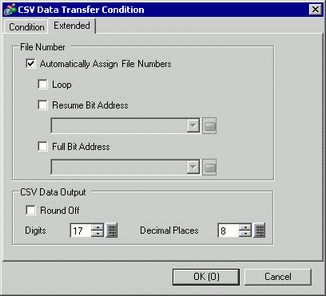
When automatically transferring from the device/PLC to an external storage device, you can automatically allocate file numbers to create new files. (This has no effect on automatic transfers from the external storage to the device/PLC.)

Automatically Assign File Numbers
Enable this feature when reading data from the device and saving to external storage as a CSV file. Numbering occurs until the designated [End]. After that, data is not transferred. To overwrite existing files and continue transferring, use [Loop] or [Resume Bit Address].
![]() 26.10.4 About Automatic Numbering
26.10.4 About Automatic Numbering
Loop
Specify whether to enable loop action, in which when the File Number reaches the designated [End] and a new file is created, the oldest file is deleted and files are overwritten in order beginning with [Start].
Resume Bit Address
Designate whether or not to set a bit address to resume transmission when the file number has reached the designated [End].
When this bit address is turned ON and after the [Control Word Address] is turned ON, files are created from the designated [Start].
Full Bit Address
Confirms that the file number has reached the designated [End]. This bit address turns ON when File Number reaches the [End].
CSV Data Output
Defines how to format data when output to a CSV file.
This setting is available when the condition setting [Display Format] is [Float].
Round Off
Sets whether to round off digits. Numbers are truncated if not rounded.
Digits/Decimal Places
In the [Digits] field, define the number of output digits from 1 to 17. This includes the number of [Decimal Places].
The allowable range for [Decimal Places] should be less than the value set in [Digits].